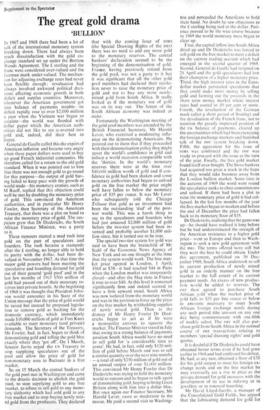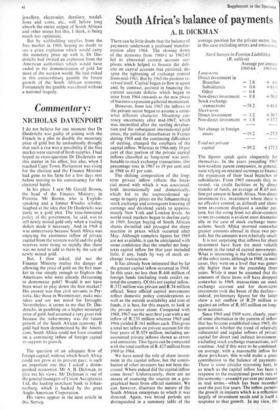The great gold drama
`BULLION'
In 1967 and 1968 there had been a lot of talk of the international monetary system breaking down. There had always been much dissatisfaction with the gold ex- change standard set up under the Bretton Woods Agreement. The £ sterling and the franc were considered over-valued and the German mark under-valued. The mechan- ism for adjusting exchange rates had never been flexible enough: revaluation had always involved awkward political deci- sions affecting economic growth in both deficit and surplus countries. Moreover, whenever the American government got into balance of payments trouble—its deficit rapidly rose to over $2,000 million a year when the Vietnam war began to escalate—the world was flooded with dollar paper which the American auth. orities did not like to see, converted into gold and, indeed, did their best to freeze.
General de Gaulle called this the expOrt of American inflation and became very angry when these paper dollars were used to buy up good French industrial companies. He therefore called for a return to the old gold standard. When it was pointed out to him that there was not enough gold to go round for this purpose—the output of gold hav- ing failed to keep pace with the growth of world trade—his monetary cronies, such as M Rueff, replied that this objection could well be met by doubling the monetary price of gold. This convinced the American authorities, and in particular Mr Henry Fowler, then Secretary of the American Treasury, that there was a plot on hand to raise the monetary price of'gold. The sus- picion grew that Dr Diederichs, the South African Finance Minister, was a party to it.
These rumours started a mad rush into gold on the part of speculators and hoarders. The rush became a stampede after the £ sterling, no longer able to hold its parity with the dollar, had been de- valued in November 1967. At that time the major gold powers had been meeting the speculative and hoarding demand for gold out of their general 'gold pool' and in the last few months of 1967 $700 million of gold had passed out of their monetary re- serves into private hoards. At the beginning of 1968 it was thought that President John- son would announce in his State of the Union message that the price of gold would be raised but instead he proposed legisla- tion to remove gold as backing for the domestic currency, which immediately made $10,000 million of gold at Fort Knox available to meet monetary (and private) demands. The Secretary of the Treasury, Mr Fowler, had, in fact, begun to think of demonetising gold and telling the gold bloc exactly where they 'got off'. On 1 March, Senator Javits urged the us Treasury to stop supplying speculators out of the pool and allow the price of gold for non-monetary uses to fluctuate in a free market.
So on 15 March the central bankers of the gold pool met in Washington and came to the drastic decision to abolish the gold pool, to stop supplying gold to any free market, to refuse to sell gold to any mone- tary authority which had sold gold to any free market and to stop buying newly min- ed gold from the producers. They declared that with the coming issue of sits (the Special Drawing Rights of the IMF) there was no need to add any more gold to the monetary reserves. The central bankers' declaration seemed to be the beginning of the demonetisation of gold.
France, having previously retired from the gold pool, was not a party to it but it was significant that all the other gold pool members had declared their resolu- tion never to raise the monetary price of gold and not to buy any more newly- mined gold from South Africa. It really looked as if the monetary use of gold was on its way out. The future of the South African economy was indeed at stake.
Fortunately the Washington meeting of the gold pool members was attended by the British Financial Secretary, Mr Harold Lever, who exercised a moderating influ- ence on the demonetising Americans. He pointed out to them that if they proceeded with their demonetisation policy they might upset the world's confidence in gold and induce a world recession comparable with the 'thirties. In the world's monetary reserves there were at the time over $40,000 million worth of gold and if con- fidence in gold had been shaken and some monetary authorities had begun to unload gold on the free market the price might well have fallen to below the monetary price of $35 per ounce. It was Mr Lever who subsequently told the Chicago Tribune that gold as an investment had been the outstanding 'dud' of the post- war world. This was a harsh thing to say to the speculators and hoarders who had just amassed $2,000 million of gold before the two-tier system had been in- vented and probably another $1,000 mil- lion since, but it turned out to be true.
The special two-tier system for gold was said to have been the brainchild of Mr Stahl of the Economic News Agency of • New York and no one thought at the time that the system would work. The free mar- ket price opened in London, 1 April; 1968 at $38—it had reached $44 in Paris when the London market was temporarily closed—and after the May riots in France it rose to over $40. At this level it remained significantly firm and indeed seemed to have a firm upward trend. South Africa was now isolated from the monetary world and was in the position to force up the price on the free market by withholding supplies of newly mined gold. Then to the dismay of Mr Henry Fowler Dr Died- erichs began to act as if lire were a monopolist anxious to squeeze the market. The Finance Minister stated in July that owing to a strong balance of payments position South Africa would have no need to sell gold for 'a considerable time to come'. He had, in fact, sold only $120 mil- lion of gold before March and was to sell a similar quantity over the next nine months —a total of only $250 million of gold out of an annual output of over $1,000 million. • This convinced Mr Henry Fowler that Dr Diederichs was trying to hold the monetary world to ransom and he began to talk again of demonetising gold, hoping to bring Great Britain along with him into a dollar bloc. But once again our Finance Secretary. Mr Harold Lever, came as moderator to the rescue. He paid a second visit to Washing- ton and persuaded the Americans to hold their hand. No doubt he saw objections to the £ sterling being tied to the dollar. Pati- ence proved to be the wise course because in 1969 the world monetary mess began to clear up.
First, the capital inflow into South Africa dried up and Dr Diederichs was forced to sell gold on the free market to meet a deficit on the current trading account which had emerged in the second quarter of 1969. Second, General de Gaulle had resigned on 28 April and the gold speculators had lost their champion of a higher monetary price. Third, the high interest rates in the Euro- dollar market persuaded speculators that they could make more money by selling gold and farming out the proceeds in the short term money market where interest rates had soared to 10 per cent or more. Fourth. the revaluation of the German mark (after a short period of floating) and the devaluation of the French franc, not to mention the greatly improved position of the UK balance of payments. cleared up the uncertainties which had been exercising the foreign exchange markets and banished talk of the IMP• system breaking down. Fifth, the agreement for the issue of sits was confirmed and the um; was ready to proceed with the issue at the turn of the year. Finally, the free gold market found itself over-bought. The Swiss bankers had acquired too great a stock in the hope that they would take business away from the London bullion market. Some time in the autumn of 1969 the word went round the speculative ranks to close commitments • and unload. If there had been a plot to raise the monetary price of gold it had col- lapsed. In the last few months of the year the free market began to weaken and before the end of December the price had fallen back to its monetary floor of $35.
Dr Diederichs, realising that the game was up—he should have realised it long before but he had underestimated the strength of the American resistance to a higher gold price—went to Europe and then to Wash- ington to seek a new gold agreement with the IMF. The terms offered were stiff but they were the best he could obtain. Under this agreement, published on 30 Dec- ember 1969, South Africa undertook to sell its current production of newly mined gold in an orderly manner on the free market to the full extent of its current payment needs. An excess of new produc- tion would be added to reserves. The IMF then agreed to purchase South African gold when the market price of gold falls to $35 per fine ounce or below in amounts necessary to meet South African foreign exchange needs during any such period (the amount on any one day being commensurate with one-fifth of weekly sales). The IMF will also pur- chase gold from South Africa in the normal course of IMF transactions relating to members 'special drawing rights' and gold quotas.
It is doubtful if Dr Diederichs could have obtained better terms even if he had gone earlier in 1968 and had confessed his defeat. He had, at any rate, obtained a floor of $35 for his gold output to meet his foreign ex- change needs and on the free market he may eventually see a rise in price as the private. demand for gold increases with the development of its use in industry or In jewellery or in renewed hoarding. Mr David Lloyd-Jacobs. a manager of the Consolidated Gold Fields, has argued that the fabricating demand for gold for jewellery, electronics, dentistry, medal- lions and coins, etc., will before long absorb the entire output of South African and other mines but this, I think, is being much too optimistic. But by withholding supplies from the free market in 1968, hoping no doubt to see a price explosion which would carry the monetary price up with it, Dr Die- derichs had invited an explosion from the American authorities which would have ended in the demonetisation of gold for most of the western world. He had risked in this extraordinary gamble the future growth of the South African economy. Fortunately the gamble was closed without a national tragedy.























































 Previous page
Previous page